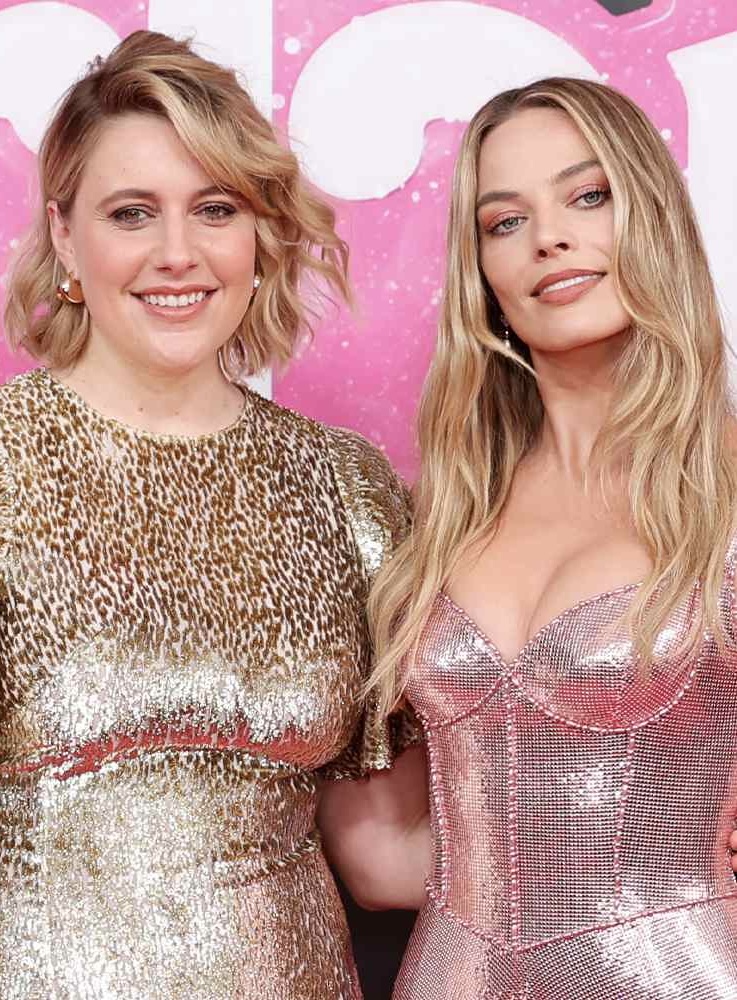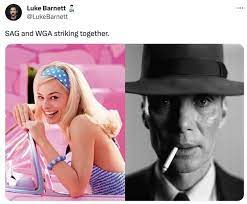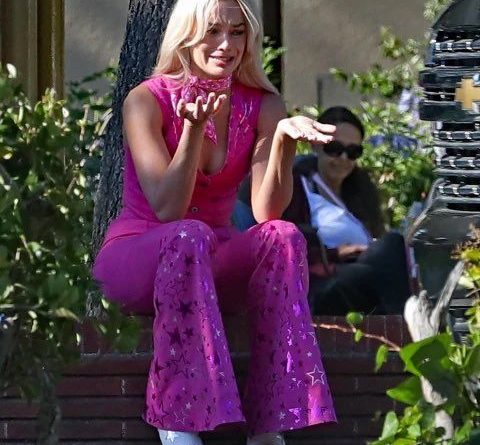Friday Film: Barbie v Oscar
Barbie v Oscar
By Rehna
When even the former First Lady, Hillary Clinton, rather inexplicably, posted about it a political flame was added to the movie fire that was already raging across the Internet and social media platforms. Her opponents claimed Clinton was likening her 2016 defeat in the US presidential race to it. The man who beat her in that race, Donald Trump, is the likely Republican nominee, again, in this year‘s election. So, for political balance, did he now have to be stopped on the campaign trail and asked for his views on it?
Should the Pope and King Charles share their thoughts?
In a British general election year, what does Rishi Sunak (or whoever the latest prime minister is) think about it all? Given his definition of what a woman is, does Labour leader Sir Keir Starmer even know what the issue is?
Are social commentators right when they say that it is already in the top five stupidest debates of 2024 even though it’s only January?
So many questions. So much time on the Internet, it seems, to fight over them and ‘it’.
‘It’, of course, is Barbie v Oscar. A battle of Alien v Predator, King Kong v Godzilla proportions.
Let’s rewind.
Last Tuesday, the Academy of Motion Picture Arts and Sciences announced its nominations for this year’s Oscars. Many of the nominations made social media happy. But under the Best Director category, Barbie fans noticed a giant crater where Greta Gerwig’s name should have been. And under Best Actress the words Margot Robbie were missing in action.
The fury was instant. The questions came thick and fast.
Was this the Academy proving the very premise of the Barbie movie?
How could Barbie be nominated for Best Picture but the woman whose vision brought it into being not be acknowledged in her role as Director?
How can two supporting actors (notably Ryan Gosling as Ken) be recognised with nominations but the titular, female heart and soul of the film not be?
All valid questions. The attempts to answer or comment on them have been raging since. Everyone has an opinion. Inevitably, some have used the opportunity to push agendas and biases and to obnoxious with it. However, the discourse has also been passionate but articulate and interesting. Persuasive arguments have been made for why the two women should have been nominated in those two important categories. Reasoned ones have been made for why they should not have. The Academy may secretly not be too displeased with all the attention, even if it is mostly negative against it. The Oscars are being talked about across the board and to quote Oscar Wilde, the only thing worse than being talked about is not being talked about.

So, where does it leave us? Still fuming or trying to get some perspective?
For my part, I start from the basis that I liked the film. I like Greta Gerwig. I like Margot Robbie. On balance, I think they should have been nominated in the two big individual categories. Each is actually nominated, as producer, in the Best Picture category, which is the most coveted award but that is a group effort and, of course there’s something special about being recognised as an individual. Gerwig also has a nomination for Best Adapted Screenplay and the film, overall, has six other nominations, including Gosling for Best Supporting Actor and America Ferrera for Best Supporting Actress. No doubt, a fully nominated team would have brought the sort of joyous pizzazz to the ceremony, next month, which it has sorely lacked in the past few years. It would have helped the tv ratings and just been a happy ending to a glorious year for the film.
I still expect the Barbie team to turn up and steal the show. I still expect they will be in celebratory mood (as they should be) for the fabulous year they’ve had, but the media focus and chatter will inevitably be about the ‘missing’ nominations and that will put a slight damper on things.
So, let’s leave that cloud and consider 5 reasons why it’s okay that Greta and Margot were not nominated – not 5 reasons why it doesn’t ‘matter’ because clearly it does matter to many people – but why it’s okay.
1. Barbie made $1.4 billion at the box office. It was, without question THE event movie of the year. Whether they loved the idea of the film or hated it, everyone was aware of it. Millions of people around the world made the effort to dress up to go see it. It was a social and cultural phenomenon. You had fathers in pink ties taking their young daughters in pink dresses and T-shirts to go see the film. Mothers reliving their childhoods through it in Barbie tops and pink feather boas. Groups of friends dazzling in pink sequins, posing for selfies in the Barbie boxes in cinema foyers. Celebrities and politicians posting photographs of themselves in their pink outfits, trying to soak up some of the positive PR. It was silly and frivolous and downright glorious. Other films have made lots of money but they haven’t had this kind of universal impact.
The marketing was genius. None more so than whoever came up with the brilliant Barbenheimer concept; linking a film about a plastic doll to a three hour talky one about nuclear physics. It benefited both – as they once said of iconic dance duo Fred Astaire and Ginger Rogers, ‘he gave her class and she gave him sex appeal’ – but Oppenheimer did really well out of it. The double bill screenings gave it a huge audience. The photo of a smiling Margot Robbie in a pink car juxtaposed with a sombre photo of Cillian Murphy meme everyone used to illustrate different moods gave it priceless publicity. The pink and black T shirts people took to change into at the cinema as they moved from one film to the other, all helped the Christopher Nolan epic make almost a billion itself. Without the Barbie buzz it likely would have made a lot less, despite the critical acclaim.
So, Barbie, the film for and about women lifted up the film featuring mostly men. That’s a great achievement. Never again can it be said that a ‘chick flick’ doesn’t make money or doesn’t fire up audiences. Barbie is now a legitimate pink calling card for women filmmakers and actresses as they go forward and pitch their projects. Of course, it doesn’t mean that it’s plain sailing for women filmmakers from hereon, far from it, but it’s a pretty good reference point. It’s not a one-off fluke either. Wonder Woman, also helmed by a female director, did great business too. To quote another classic film, ‘if you build it, they will come.’
Barbie will have a long shelf life too, unlike some of the films that have won Oscars. It will be watched for years to come. Children in the future will watch it for the first time because it’s recommended by parents who loved it in 2023, adults will rewatch it for nostalgia, there will be singalong screenings, dress-up screenings, anniversary screenings…..
That’s a pretty great film legacy for Gerwig, with or without a director nomination.



2. After the staggering success of the film, Greta Gerwig is likely, for a time at least, to be able to name her price (and her film)for her next few projects. Expect to see her name linked to all sorts of big franchises and smaller films in the coming months. Most won’t happen but the link will be made to get some of her stardust for the project. This is a good thing. Gerwig is not a female director trying to be a male one. She doesn’t make films she thinks men will like. If they do, great. It’s a bonus, not an ambition. She seems to make the films she wants to and they just happen to coincide with her female sensibilities. She is an ‘every woman’ director too, as in, her films resonate with all kinds of women. The heroines in her films can be presidents, doctors, lawyers but they can also be mothers and wives and one choice is not painted as better than the other. They can be strong and independent but also love beautiful clothes and girly pleasures. If the women’s empowerment message in Barbie was as subtle as Ken’s fluorescent rollerblades, so too was the pink dream of Barbie world that so many little girls love. And for good measure she mixed both with Barbie’s existential crisis and fear of change. In short, women are complex. They can want and enjoy contradictory things and she unapologetically showed that. Her choice of Timothee Chalamet and Louis Garrel to play the main male characters in her 2019 version of Little Women was inspired. Anyone who has read and loved the book will know what I mean. She just ‘gets’ it .
She also seems to have a knack for understanding what will be commercially viable because people will want to see it. All this makes her a good woman to have at the top in Hollywood pitching projects women (and men)connect with.
In addition, she may not have got the Best Director nod but she may yet walk away with Best adapted screenplay and that is pretty good recognition for one of the most valuable skills in filmmaking, writing. Without good writing a film never quite takes off. So, that nomination must not be dismissed as not Kenenough. (Sorry)!
The film’s other nominations for Production Design and Costume Design too give a nod to Gerwig’s overall vision. She may not have designed the sets or costumes but both can only have materialised though discussions with her and how she envisaged the final look of the film.
3. Margot Robbie’s post Barbie future also looks rosy pink. As producer on the film she is nominated for the biggest prize of the night, Best Picture. She has recently said that she wants to take a short break from acting to focus on producing and due to the success of Barbie, like Gerwig, she too will be able to name her film for the foreseeable future. The power of a producer lies in getting a film green lit and then made. For Robbie too then, Barbie will be one heck of a calling card to go to meetings with, not because it’s a small, indie film that won Oscars but because it’s a ginormous blockbuster, superhero level success story of which she was an integral part. Robbie is not just Barbie on the screen, she brought a dream for millions of little (and not so little) girls alive at every premiere and press event. Every outfit she wore made headlines and front pages. She didn’t just promote a movie, she lived out a dream. She sold that film. That work ethic and marketing nous will stand her in good stead in future for both the smaller films she wants to make with as well as the big budget ones.
She didn’t score an Oscar nomination for Best Actress but she did make the Bafta shortlist and that is a very noteworthy recognition of what she brought to the role. She humanised a doll and that is no mean feat. The reality is, she was unlikely to win the Oscar in any event but even if she was the voters’ sixth choice she, once again, demonstrated her versatility as an actress and her ability to move between genres and types of roles. By getting into production alongside the acting she is doing what many beautiful actresses fail to do and that is achieve longevity in the profession once the youth and beauty fade. Her Oscar day will come.
4. The cries of misogyny were inevitable but unfair. Five actresses are nominated for Best Actress. Margot Robbie just didn’t make the top five. No misogyny there. Ryan Gosling, the actor, too earned his place. It’s not Ken replacing Barbie. It’s recognition for an actor doing a good job with a role that, in the wrong hands, could have been ham fisted and embarrassing.
As for Best Director there is a female director nominated. It’s Frenchwoman Justine Triet for her excellent, clever, thought provoking film Anatomy of a Fall. You only have to watch the video of her reacting to her nomination, as it was read out live, to see how much it meant to her. She puts her hands over face, completely overcome with emotion. Let’s not take her tremendous achievement away from her. It’s her first nomination and she’s in a very strong lineup; Scorsese, Nolan, Glazer, Lanthimos. Her nomination has been overshadowed by anger over Gerwig missing out and that’s unfair.
Triet revamped the legal courtroom drama with her film and brought out phenomenal performances in her actors, notably Sandra Huller, in taut, meticulously written scenes. Her accomplishments must not be minimised. The Oscars are, or should be, a celebration of great filmmaking but increasingly they are turned into gripes about people’s favourites not being nominated or winning. Triet has made a fantastic film and she should be celebrated, as should her nomination. Her movie won’t make a billion but she’s flying the flag for women directors in a very competitive year. Greta Gerwig would, I expect, applaud her.
5. Life goes on.
It really does. Both Greta and Margot will be fine.
Console yourselves with the thought that a Barbie film was originally considered starring Amy Schumer……
Nominations or not, it’s been a Barbie world in recent months and we’ve all just been living in it. And look, we can do all this again next year when our 2024 faves don’t make the cut!

